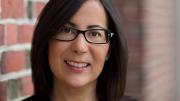Mellon professor of religion and Latinx studies Mayra Rivera was never a fan of apocalyptic narratives—“at all, actually.” But in 2017, Hurricane Maria devastated her native Puerto Rico, causing more than 3,000 deaths (some never officially acknowledged) and cataclysmic damage, and Rivera found herself rethinking. “This is a moment when, especially because of climate change, there’s a need to imagine a world that is ending or changing so significantly that we no longer recognize it. And some of the most prevalent imagery we have for this imagining,” she says, is in poetry, literature, and art “drawn from Christian texts”—in particular, the biblical Book of Revelation, which describes fire consuming much of the earth, seas turned to blood, rivers polluted, animals dead, the sun darkened by smoke. Drawn from Jewish literatures set in the context of the Roman empire, Revelation connects to another thread in Rivera’s work, too. Focusing on the Caribbean, she studies how theories of colonialism, race, and gender intersect with literature and the philosophy of religion. In Puerto Rico, she says, colonialism persists in contaminated water and land, in the history of nonconsensual medical experimentation, in everyday language and food and religious traditions: “It shapes concepts we use all the time.” These influences gnawed at Rivera even during her first career as a chemical engineer in San Juan (engineering she inherited from her father; religion from her devout mother). She spent 10 years working for Coca-Cola and consulting for pharmaceutical companies before embarking on theology full-time. “It was a need for the humanities, frankly,” she says. “Growing up, I always loved literature and the philosophical questions it asked about the world. Religion was the other discourse that I knew was interested in those questions.”
Harvard Portrait: Mayra Rivera
Harvard Portrait: Mayra Rivera
How apocalyptic narratives help make sense of the modern world

Mayra Rivera
Photograph by Steph Stevens
You might also like
Eating for the Holidays, the Planet, and Your Heart
“Sustainable eating,” and healthy recipes you can prepare for the holidays.
Five Questions with Michèle Duguay
A Harvard scholar of music theory on how streaming services have changed the experience of music
Harvard Faculty Discuss Tenure Denials
New data show a shift in when, in the process, rejections occur
Most popular
Explore More From Current Issue

Getting to Mars (for Real)
Humans have been dreaming of living on the Red Planet for decades. Harvard researchers are on the case.

Introductions: Dan Cnossen
A conversation with the former Navy SEAL and gold-medal-winning Paralympic skier

Open Book: A New Nuclear Age
Harvard historian Serhii Plokhy’s latest book looks at the rising danger of a new arms race.





